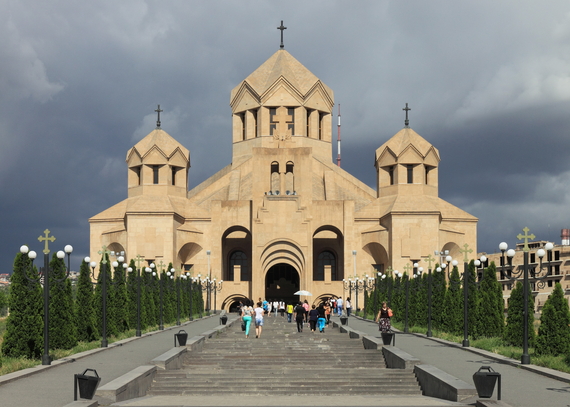Image: Saint Gregory the Illuminator Cathedral. Yerevan, Armenia. Author: Marcin Konsek / Wikimedia Commons / CC BY-SA 4.0
A priest's recent criticism of the Armenian government was a rare display of discord between a church and state that usually pull in tandem.
Father Armen Melkonian, a priest in the church's diocese in Maastricht, Holland, leveled the criticism at a rally outside the Armenian Embassy in Amsterdam last week.
The church responded by dismissing him from his priest's duties in Maastricht, although it allowed him to keep taking part in parish activities in an unofficial capacity.
The crowd outside the embassy was demanding the release of 30 armed men whom the government is prosecuting for seizing a police station in Armenia's capital of Yerevan on July 17.
The raiders, members of the political fringe group Founding Parliament, had demanded the release of the party's founder, Jirair Sefilian, and the resignation of President Serzh Sargsyan.
On the day they surrendered -- July 31 -- they also demanded that Armenia begin distancing itself from Russia. Moscow views Armenia as a colony rather than an independent country, and meddles in its affairs, they contended.
The government arrested Sefilian in June of this year on charges of plotting a coup. Like him, many of the station occupiers were heroes of the Nagorno-Karabakh War of the early 1990s.
Many Armenians are upset about the occupiers' arrests, even though the group has blood on its hands.
The raiders killed a police colonel on the day they stormed the station, and halfway through the siege a sniper killed an officer sitting in a patrol car 400 yards from the station. Police said the sniper fire came from the station. The raiders denied it.
Father Armen told those at the embassy rally that the station occupiers were heroes not only for fighting in the Nagorno-Karabakh War but also for fighting against injustices in Armenia.
The Nagorno-Karabakh conflict between 1988 and 1994 was between Azerbaijan and ethnic-Armenian separatists. Both claim the territory as their own.
An uneasy truce between the former combatants prevailed until about five years ago, when a series of flare-ups began.
One, in April of this year, led to Azerbaijani troops capturing parts of a buffer zone alongside Nagorno-Karabakh, although not territory in the enclave itself.
Russian President Vladimir Putin has been trying to broker a new Nagorno-Karabakh peace between Azerbaijan and Armenia. He has said that both sides need to make concessions to achieve a deal.
Armenians, including those in Nagorno-Karabakh, have been afraid that Sargsyan will give up some of the buffer zone and perhaps even territory in Nagorno-Karabakh to achieve a deal. Sargsyan denies that.
The two-week station occupation galvanized opposition to Sargsyan's rule that went far beyond the small number of Founding Parliament's supporters.
Crowds backing the station occupiers swelled from a couple of hundred the first night to 2,000 a night as the occupation continued.
Many Armenians are unhappy with the Sargysan administration's lack of progress addressing poverty, corruption, the huge gap between rich and poor, and other issues.
Father Armen defended his decision to speak out on a polarizing domestic political issue by noting that "the church belongs to the community, and the community regards the decision (to prosecute the station occupiers) as unjust."
The priest made even more scathing remarks about the Armenian government when he visited Antwerp, Belgium, on August 26.
Noting that the Armenian diaspora sends hundreds of millions of dollars to the homeland each year, he told members of the Armenian community in Antwerp that they -- and he -- have the right to speak out.
"How should we punish those murderers who, instead of using that money (from the diaspora) to purchase weapons to defend the borders, use it against us?" he asked.
He apparently was referring to Armenian authorities shooting a number of the police-station occupiers and using stun grenades and billy clubs against those holding demonstrating in their support.
Disputing the government's characterization of the station occupiers as terrorists, he said that "if they call them terrorists, then I say we are all terrorists."
There is evidence that Father Armen has struck a chord with the many members of the diaspora worldwide who oppose prosecuting the station occupiers. One sign was that an American Apostolic Church in Germany invited him to hold religious ceremonies there.
A key question is whether Father Armen's protest is a one-of-a-kind situation or an indication that other priests will speak out against the government.
Given the political turmoil that the station occupation engendered, a schism between church and state is one of the last things the Armenian government wants.
Armine Sahakyan is a human rights activist based in Armenia. A columnist with the Kyiv Post and a blogger with The Huffington Post, she writes on human rights and democracy in Russia and the former Soviet Union.

